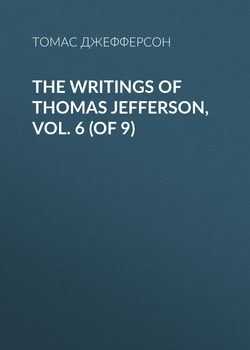Читать книгу The Writings of Thomas Jefferson, Vol. 6 (of 9) - Томас Джефферсон, Thomas Jefferson - Страница 68
PART III.—Continued.
LETTERS WRITTEN AFTER HIS RETURN TO THE U. S. DOWN TO THE TIME OF HIS DEATH.
1790-1826
TO MR. SHORT
ОглавлениеMonticello, June 18, 1813.
Dear Sir,—Yours of the 2d is received, and a copy of Higgenbotham's mortgage is now enclosed. The journey to Bedford which I proposed in my last, my engagements here have obliged me to postpone till after harvest, which is now approaching; it is the most unpromising one I have seen. We have been some days in expectation of seeing M. Correa. If he is on the road, he has had some days of our very hottest weather. My thermometer has been for two days at 92 and 92½°, the last being the maximum ever seen here. Although we usually have the hottest day of the year in June, yet it is soon interrupted by cooler weather. In July the heat, though not so great, is more continuous and steady.
On the duration of the war I think there is uncertainty. Ever since the rupture of the treaty of Amiens, the object of Great Britain has visibly been the permanent conquest of the ocean, and levying a tribute on every vessel she permits to sail on it, as the Barbary powers do on the Mediterranean, which they call their sea. She must be conscious she cannot from her own resources maintain the exaggerated fleet she now has, and which is necessary to maintain her conquest; she must, therefore, levy the deficiency of duties of transit on other nations. If she should get another ministry with sense enough to abandon this senseless scheme, the war with us ought to be short, because there is no material cause now existing but impressment; and there our only difference is how to establish a mode of discrimination between our citizens which she does not claim, and hers which it is neither our wish or interest ever to employ. The seamen which our navigation raises had better be of our own. If this be all she aims at, it may be settled at Saint Petersburg. My principle has ever been that war should not suspend either exports or imports. If the piracies of France and England, however, are to be adopted as the law of nations, or should become their practice, it will oblige us to manufacture at home all the material comforts.
This may furnish a reason to check imports until necessary manufactures are established among us. This offers the advantage, too, of placing the consumer of our produce near the producer, but I should disapprove of the prohibition of exports even to the enemy themselves, except indeed refreshments and water to their cruisers on our coast, in order to oblige them to intermit their cruises to go elsewhere for these supplies. The idea of starving them as to bread, is a very idle one. It is dictated by passion, not by reason. If the war is lengthened we shall take Canada, which will relieve us from Indians, and Halifax, which will put an end to their occupation of the American seas, because every vessel must then go to England to repair every accident. To retain these would become objects of first importance to us, and of great importance to Europe, as the means of curtailing the British marine. But at present, being merely in posse, they should not be an impediment to peace. We have a great and a just claim of indemnifications against them for the thousand ships they have taken piratically, and six thousand seamen impressed. Whether we can, on this score, successfully insist on curtailing their American possessions, by the meridian of Lake Huron, so as to cut them off from the Indians bordering on us, would be matter for conversation and experiment at the treaty of pacification. I sometimes allow my mind to wander thus into the political field, but rarely, and with reluctance. It is my desire as well as my duty to leave to the vigor of younger minds to settle concerns which are no longer mine, but must long be theirs. Affectionately adieu.
